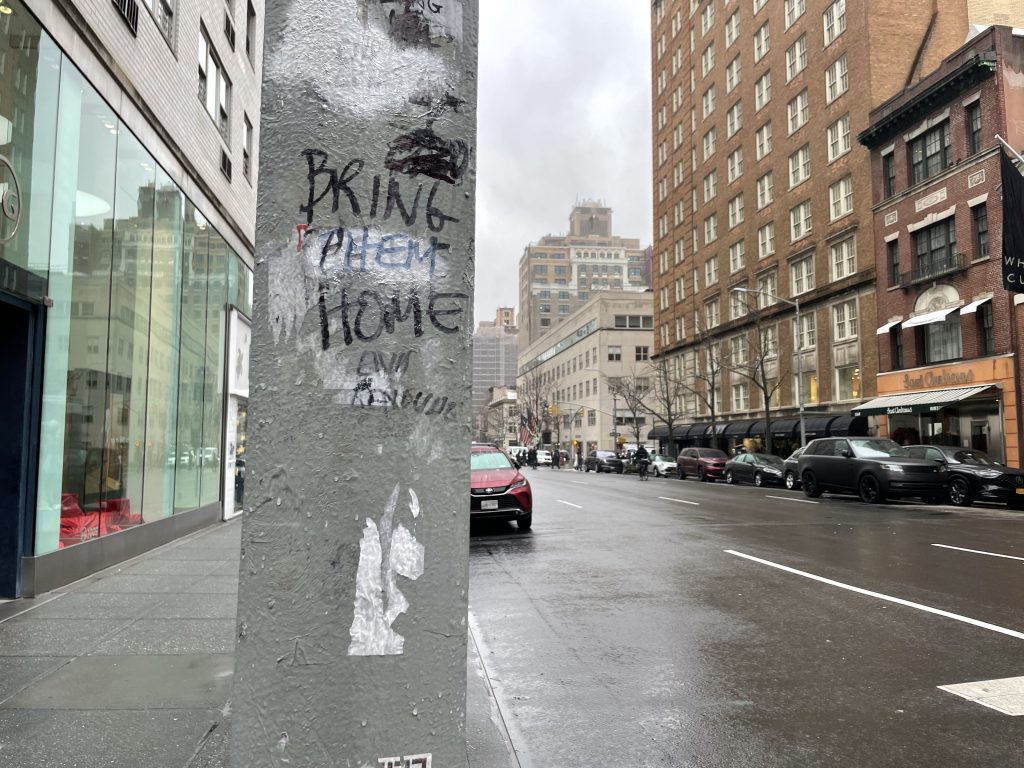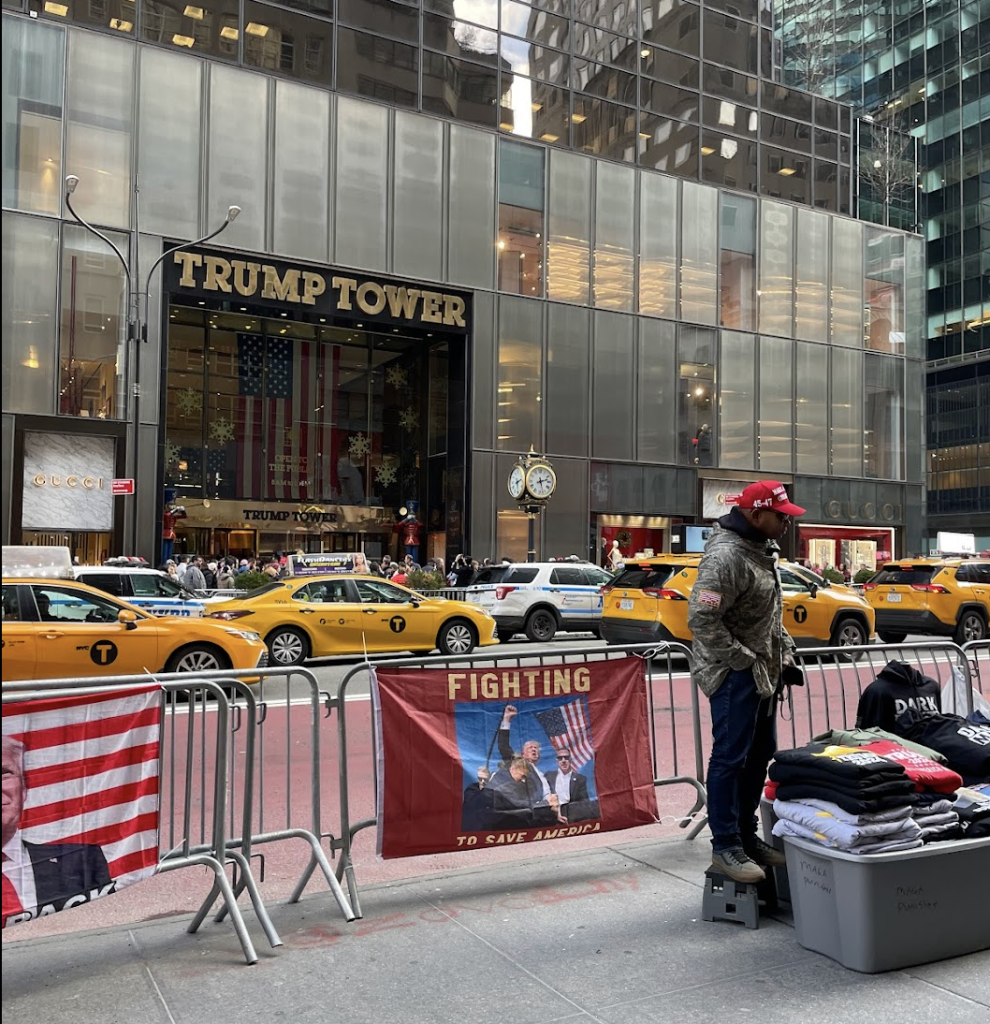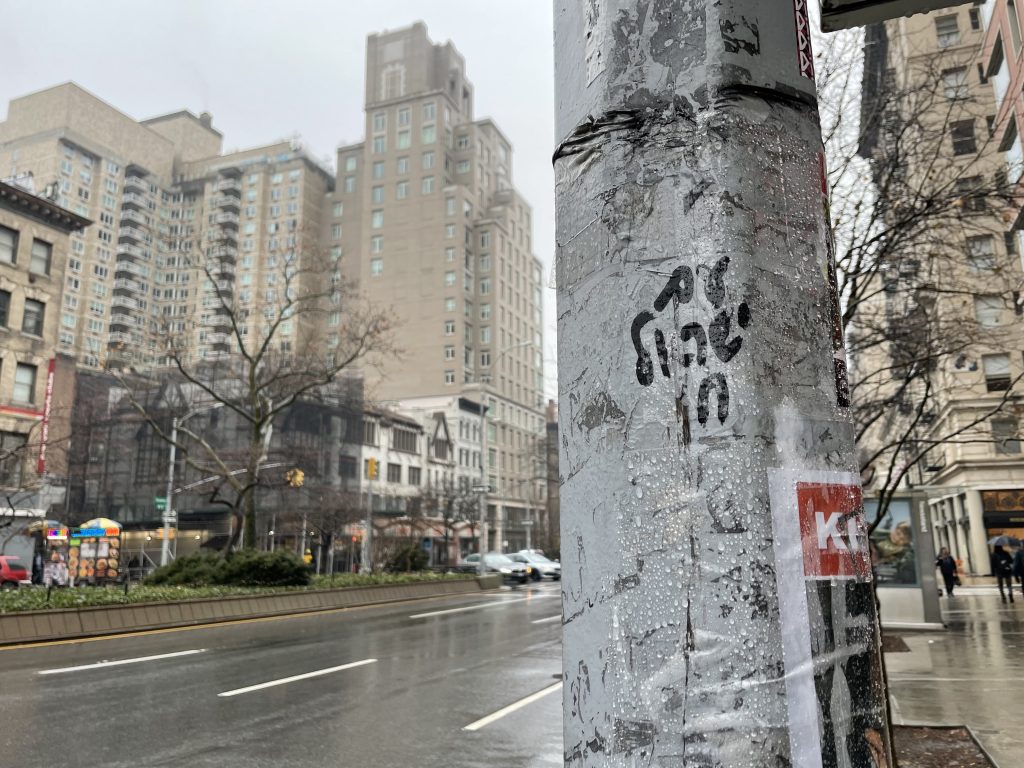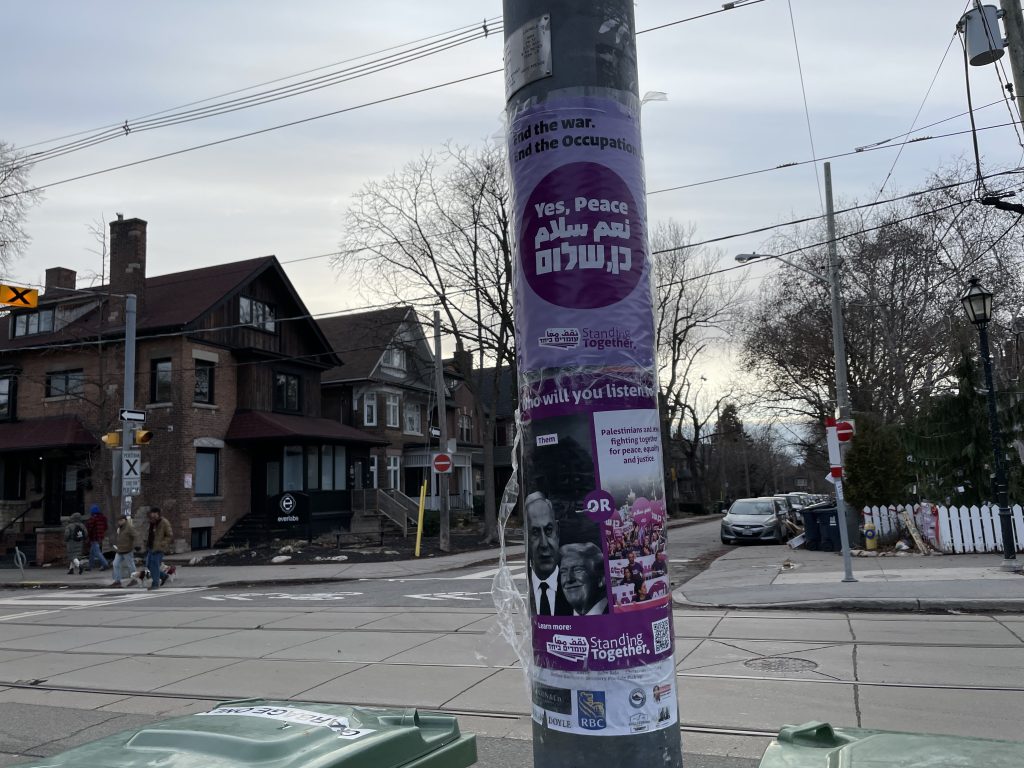RSS
New York was always a lot more Jewish than Toronto could ever be—but the contrast is more obvious now
It’s a commonplace experience of a Diaspora Jew visiting Israel to realize that suddenly, this thing that made you different is actually the least remarkable thing about you.
The character Alexander Portnoy speaks to this in Philip Roth’s novel Portnoy’s Complaint—but I’ve also just lived it when visiting Tel Aviv or Rehovot or wherever. Whether you experience it as being Othered in a bad way or as a point of pride and what makes you special, you get to Israel and lo and behold, no one is surprised that your family doesn’t celebrate Christmas or whatever. Streets are named after Jewish figures, businesses are closed on Jewish holidays, Jewishness is assumed, so distinctiveness requires other sources. Being Jewish isn’t associated with being this way or that—not with being neurotic or good with money—because Jews are everywhere you look. The bimbos and himbos are Jewish, too.
So it took me by surprise, visiting my hometown of New York City over the holiday break, to feel a bit, well, Israel-visit-ish while there. It’s not that everyone is Jewish (nor, for that matter, is everybody Jewish in Israel), but rather that there’s just some crucial difference in population and culture such that it is not a whole thing to be Jewish in post-Oct. 7 New York, not in the way it is in Toronto. Goodness knows that relative to plenty of places, Toronto’s got Jews. But it is, at most, a city with some Jewish areas. We’re Canadian, sure, but one of the city’s many Others.

The streets of Manhattan are not lined with signage admonishing passersby to reflect on Israel’s misdeeds. You can walk for blocks or even days on end and not see a keffiyeh, not because the United States bans free expression but because the interest just isn’t there. The little that remained of post-Oct. 7 signage was more in the hostage-freeing realm than the other sort.
But there isn’t a tremendous amount of pro-Israel this-and-that, either. (I saw maybe one baseball cap expressing support for Israel?) It’s more like, look at all the shiny things you can buy in America, and particularly in Manhattan, so have at it! Shiny things and, uh, MAGA-wear.

But there’s an underlying Jewishness that’s just so much in the air you wouldn’t notice it if it’s part of your everyday life. There are the old standbys (food shops like Zabar’s, etc.) but also newcomers. Breads Bakery is not that new, but it’s newly ubiquitous, and unambiguously, unapologetically Jewish, from the Happy Challahdays signage to the sufganiyot labeled as such. In corporate lobbies and whatnot, no Christmas tree lacks an accompanying menorah. This is not because ‘woke’ or whatever, it’s not a war on Christmas, it’s what the population demands. I heard no shortage of Hebrew.
This is not about better or worse; I am describing the world as it is. Not to suggest anyone up and move (not a trivial thing, even for dual citizens) in either direction. And the thing I experience when I walk out the door in Toronto, where the fact that I’m Jewish is this whole thing, one that is interpreted by some as a prompt for theses on geo-politics that I simply don’t have, is not one in New York, where Jewish is among many unremarkable ways to be. So, Phoebe, you’re Jewish, what’s that about? In New York, no one thinks to start that conversation. Fine not no one, it depends the environment, but it wouldn’t be nearly as regular an occurrence.
Whereas a man in Zabar’s told me that he went to school with the store’s founder, what would have been about 70 years ago. Why did he tell me this? Because it’s what you do while you wait for lox, you tell the person standing next to you your life story. Torontonians would never. We’re too busy not talking to people to whom we haven’t been formally introduced, or, I guess, sorting out the Middle East by leaving what are, in effect, passive-aggressive notes. On the plus side, we can buy our groceries without anyone chatting with us, if we’re not feeling it that day.

Mainly, though, I did not experience public space as a demand to form a coherent position on Middle East politics. This is not because the city lacks anyone who ponders such things (Columbia University is located in Manhattan) but because there’s a level of Jewish presence—or, even in Manhattan, American conservatism—that acts as a buffer against the flags-flyers-keffiyehs blanketing of public space. It struck me the moment I was back in Toronto just how visible the conflict is, including—if less so, in Roncesvalles Village—the pro-Israel side of things.

While I was there, I kept thinking: what are the authors of the anthology On Being Jewish Now, clustered as they are in the part of NYC I come from, experiencing? Or rather, how would they react to so much as five minutes anywhere other than the Upper East or West Sides? Places where a kind of secular-ish cultural Jewishness is so entrenched that you don’t ever really think you’re alone in believing, for example, that Israelis are human beings and not evil abstractions. It started to make sense why so many of the tensions they describe occurred online. I suppose that’s how it goes in areas where you can go to the local coffee shop and forget all that stuff.
The thing one says about Israel is that its existence makes Jews elsewhere safer, even ones who have no interest in packing up and moving there. Can the same be said of New York? Unclear. All I can say with confidence is that I spent what would amount to a zillion Canadian dollars over the course of a few days on the excellent pastries from Breads Bakery.
The CJN’s opinion editor Phoebe Maltz Bovy can be reached at pbovy@thecjn.ca, not to mention @phoebebovy on Bluesky, and @bovymaltz on X. She is also on The CJN’s weekly podcast Bonjour Chai. For more opinions about Jewish culture wars, subscribe to the free Bonjour Chai newsletter on Substack.
The post New York was always a lot more Jewish than Toronto could ever be—but the contrast is more obvious now appeared first on The Canadian Jewish News.
RSS
US Clamps Sanctions on Israel-bashing UN Rights Monitor Albanese

Francesca Albanese, UN special rapporteur on human rights in the Palestinian territories, attends a side event during the Human Rights Council at the United Nations in Geneva, Switzerland, March 26, 2024. Photo: REUTERS/Denis Balibouse
The Trump administration has imposed sweeping sanctions against Francesca Albanese, the United Nations Special Rapporteur for the Occupied Palestinian Territories, citing the UN official’s lengthy record of singling out Israel for condemnation.
In a post on X, US Secretary of State Marco Rubio announced the sanctions under a February executive order targeting those who “prompt International Criminal Court (ICC) action against U.S. and Israeli officials, companies, and executives.” He accused Albanese of waging “political and economic warfare” against both nations and asserted that “such efforts will no longer be tolerated.”
“Today I am imposing sanctions on UN Human Rights Council Special Rapporteur Francesca Albanese for her illegitimate and shameful efforts to prompt [International Criminal Court] action against U.S. and Israeli officials, companies, and executives,” Rubio announced on X/Twitter.
“Albanese’s campaign of political and economic warfare against the United States and Israel will no longer be tolerated,” declared the Trump administration’s top foreign affairs official. “We will always stand by our partners in their right to self-defense.”
Rubio concluded: “The United States will continue to take whatever actions we deem necessary to respond to lawfare and protect our sovereignty and that of our allies.”
The decision to impose sanctions on Albanese marks an escalation in the ongoing feud between the White House and the United Nations over Israel. The Trump administration has repeatedly accused the UN and Albanese of unfairly targeting Israel and mischaracterizing the Jewish state’s conduct in Gaza.
Albanese, an Italian lawyer and academic, has held the position of UN special rapporteur on human rights in the Palestinian territories since 2022. The position authorizes her to monitor and report on alleged “human rights violations” by Israel against Palestinians in the West Bank and Gaza.
Last week, Albanese issued a scathing report accusing companies of helping Israel maintain a so-called “genocide economy.” She called on the companies to cut off economic ties with Israel and warned that they might be guilty of “complicity” in the so-called “genocide” in Gaza.
Critics of Albanese have long accused her of exhibiting an excessive anti-Israel bias, calling into question her fairness and neutrality.
Albanese has an extensive history of using her role at the UN to denigrate Israel and seemingly rationalize Hamas’ attacks on the Jewish state.
In the months following the Palestinian terrorist group’s atrocities across southern Israel on Oct. 7, 2023, Albanese accused the Jewish state of perpetrating a “genocide” against the Palestinian people in revenge for the attacks and circulated a widely derided and heavily disputed report alleging that 186,000 people had been killed in the Gaza war as a result of Israeli actions.
The action comes as Israeli Prime Minister Benjamin Netanyahu visits Washington, where he has received a warm reception from the Trump administration. Netanyahu has been meeting with US officials to discuss next steps in the ongoing Gaza military operation.
Gideon Sa’ar, Minister of Foreign Affairs for Israel, commended the Rubio announcement with his own post on X/Twitter, exclaiming: “A clear message. Time for the UN to pay attention!”
The post US Clamps Sanctions on Israel-bashing UN Rights Monitor Albanese first appeared on Algemeiner.com.
RSS
Hardball: Trump Administration Reports Harvard to Accreditor Over Antisemitism Allegations

US President Donald Trump speaks during a Cabinet meeting at the White House in Washington, DC, July 8, 2025. Photo: Kevin Lamarque via Reuters Connect.
The Trump administration escalated its showdown against Harvard University on Wednesday, reporting the institution to its accreditor for alleged civil rights violations resulting from its weak response to reports of antisemitic bullying, discrimination, and harassment following Hamas’ Oct. 7, 2023 massacre across southern Israel.
The US Department of Education (DOE) announced the action on Wednesday. Citing Harvard’s admitted failure to treat antisemitism as seriously as it treated others forms of hatred in the past, the DOE called on the New England Commission of Higher Education to review and, potentially, revoke its accreditation — a designation which qualifies Harvard for federal funding and attests to the quality of the educational services its provides.
“Accrediting bodies play a significant role in preserving academic integrity and a campus culture conducive to truth seeking and learning,” said Secretary of Education Linda McMahon. “Part of that is ensuring students are safe on campus and abiding by federal laws that guarantee educational opportunities to all students. By allowing anti-Semitic harassment and discrimination to persist unchecked on its campus, Harvard University has failed in its obligation to students, educators, and American taxpayers.”
The DOE, McMahon added, “expects the New England Commission of Higher Education to enforce its policies and practices, and to keep the Department fully informed of its efforts to ensure that Harvard is in compliance with federal law and accreditor standards.”
As previously reported by The Algemeiner, Harvard’s Presidential Task Force on Combating Antisemitism has acknowledged that the university administration’s handling of campus antisemitism fell well below its obligations under both Title VI of the Civil Rights Act of 1964 and its own nondiscrimination policies.
In a 300-plus-page report, the task force compiled a comprehensive record of antisemitic incidents on Harvard’s campus in recent years — from the Harvard Palestine Solidarity Committee’s endorsement of the Oct. 7 terrorist atrocities to an anti-Zionist faculty group’s sharing an antisemitic cartoon depicting Jews as murderers of people of color. The report identified Harvard’s past refusal to afford Jews the same protections against discrimination enjoyed by other minority groups as a key source of its problem.
Coming several weeks after President Donald Trump ordered the freeze of $2.26 billion in federal research grants and contracts for Harvard, the task force report found it was “clear” that antisemitism and anti-Israel bias have been fomented, practiced, and tolerated not only at Harvard but also within academia more widely.”
The university is now suing the federal government over the funding halt.
President Trump has spoken scathingly of Harvard, calling it, for example, an “Anti-Semitic, Far Left Institute … with students being accepted from all over the world that want to rip our Country apart” in an April post to his Truth Social platform.
In recent weeks, however, both Trump and McMahon had commended Harvard’s constructive response in negotiations over reforms the administration has asked it to implement as a precondition for restoring federal funds. The requested reforms include hiring more conservative faculty, shuttering diversity, equity, and inclusion [DEI] programs, and slashing the size of administrative offices tangential to the university’s central educational mission.
The administration has since changed its tone in the wake of a report by The Harvard Crimson that interim Harvard President Alan Garber has said “behind closed doors” that he has no intention of doing anything that would make Harvard more palatable to conservatives.
Earlier this month, the Trump administration’s Joint Task Force to Combat Antisemitism issued Harvard a formal “notice of violation” of civil rights law. Charging that Harvard willfully exposed Jewish students to a flood of racist and antisemitic abuse both in and outside of the classroom, it threatened to strip whatever remains of Harvard’s federal funding.
“Failure to institute adequate changes immediately will result in the loss of all federal financial resources and continue to affect Harvard’s relationship with the federal government,” wrote the federal officials comprising the multiagency Task Force. “Harvard may of course continue to operate free of federal privileges, and perhaps such an opportunity will spur a commitment to excellence that will help Harvard thrive once again.”
In Wednesday’s announcement, US Department of Health and Human Services Secretary Robert F. Kennedy Jr. said Harvard’s conduct “forfeits the legitimacy that accreditation is designed to uphold.”
“HHS and Department of Education will actively hold Harvard accountable through sustained oversight until it restores public trust and ensures a campus free of discrimination,” he said.
Follow Dion J. Pierre @DionJPierre.
The post Hardball: Trump Administration Reports Harvard to Accreditor Over Antisemitism Allegations first appeared on Algemeiner.com.
RSS
IDF Strikes Hezbollah Sites in South Lebanon as Terror Group Pushes to Rebuild Amid US Disarmament Talks

IDF operating in southern Lebanon. Photo: IDF Spokesperson
Israeli forces uncovered and destroyed Hezbollah weapons caches in southern Lebanon on Wednesday, as a new report indicated that despite ongoing U.S.-led efforts to secure a disarmament deal, the Iran-backed group is making repeated, largely concealed attempts to rebuild its military presence in the area.
Troops carried out several operations targeting Hezbollah infrastructure in southern Lebanon on Wednesday morning, destroying weapons depots, explosives and multibarrel launchers concealed in forested terrain, the IDF said, in violation of the November ceasefire, which requires Hezbollah to withdraw its forces 20 miles from the Israeli border.
A new report released this week by the Alma Research and Education Center found that Hezbollah is focused on rebuilding in three areas: operational deployment, weapons acquisition, and financial recovery.
“Hezbollah didn’t give up its resistance narrative and motivation,” Alma’s director, Lt. Col. (Res.) Sarit Zehavi, told The Algemeiner.
“It wants to rebuild its capabilities and infrastructures, whether it’s the villages that will be used as human shields or the military infrastructure in South Lebanon and in Lebanon in general.”
According to Zehavi, Hezbollah is attempting to return Radwan fighters to positions south of the Litani River as part of a wider plan to restore its elite forces to operational readiness. The IDF on Monday killed Radwan commander Ali Abd al-Hassan Haidar in a targeted strike. The action came hours after US Special Envoy for Syria Thomas Barrack met with Lebanese President Joseph Aoun, Prime Minister Nawaf Salam and Parliament Speaker Nabih Berri in Beirut to discuss a long-term deal that would include an Israeli withdrawal and complete disarmament of Hezbollah.
Barrack described the Lebanese response to the proposal as positive. Later, he issued a blunt warning to Hezbollah in response to a vow by the terror group’s leader, Naim Qassem, not to lay down its arms. “If they mess with us anywhere in the world, they will have a serious problem with us,” Barrack said in an interview with Lebanese news network LBCI. “They don’t want that.”
Zehavi said it was premature to predict the outcome of the diplomatic efforts. She warned that the challenge of disarming Hezbollah remains enormous and emphasized that the Lebanese Armed Forces have not demonstrated the capability or willingness to confront the group.
“It’s too soon to be optimistic or pessimistic,” she said, noting that no firm commitments have emerged from the Beirut talks.
Hezbollah’s efforts to smuggle and manufacture weapons have been complicated by both Israeli strikes and the regional realignment over recent months. While Israeli strikes have disrupted many supply routes, according to Zehavi, Syrian authorities have intercepted far more Hezbollah-bound weapons than the Lebanese Army, which claims to have uncovered 500 arms caches but has provided no evidence.
The financial front marks the third aspect of Hezbollah’s rebuilding effort. Last week, the group halted cash payments to Shiite civilians whose homes were damaged in the war, citing liquidity problems. Zehavi attributed the shortfall to disruptions in Iran’s funding networks — an outcome of the 12-day war against the regime in Tehran — and said the constraints would likely hamper Hezbollah’s ability to compensate its base and sustain operations.
“I hope they will continue to have problems with the cash flow, that way it will be very difficult for them to recover,” she said.
The post IDF Strikes Hezbollah Sites in South Lebanon as Terror Group Pushes to Rebuild Amid US Disarmament Talks first appeared on Algemeiner.com.
